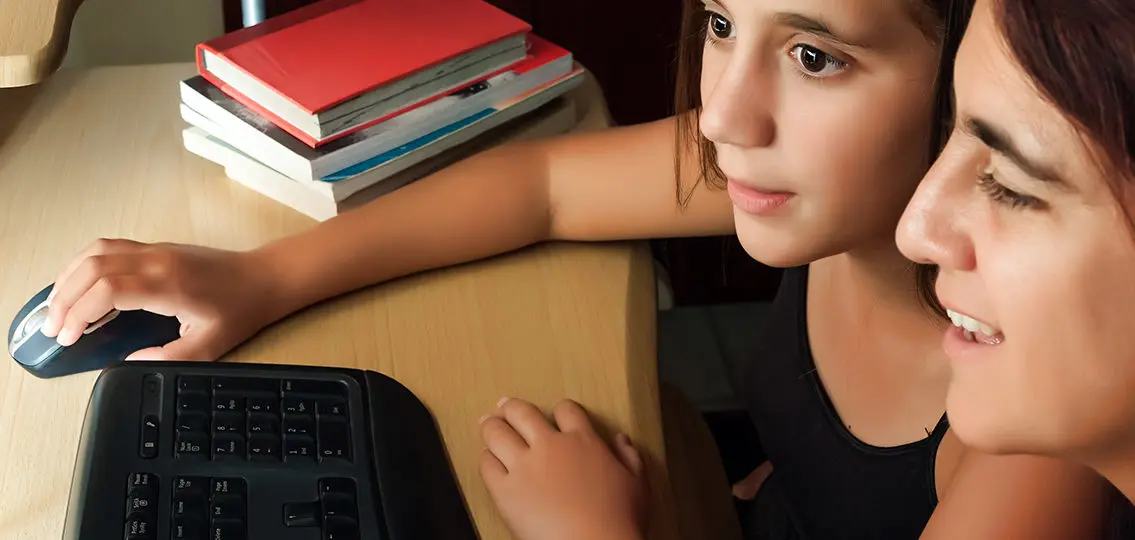As schools decide when and how to re-open following CDC guidelines for social distancing, many parents are grappling with decisions about school. As a high school English teacher, as well as a parent of a tween and a teen, I understand what a difficult decision it can be, trying to choose between distance learning and in-person, but socially distanced, school.

We debated the choices, and the risks, as a family and opted for our school district’s hybrid model, which allows our 11-year-old and 14-year-old to attend school two days a week and work online for the other three days.
Although this feels like a reasonable compromise, my kids will still work online more than half the time and they will miss much of the social interaction that was part school before “these unprecedented times.” So the question becomes how to help with online learning? With that in mind, here are seven strategies I plan to use to help my kids make the most of online learning.
7 Ideas for Making the Most of Online Learning
1. Schedule outings and activities whenever possible.
This might be a hike, picnic, or a private lesson. Ideally, we’ll have something scheduled most days, but it may be as simple as going for a bike ride or walk together.
With some of these scheduled activities, my children will likely complain that I am giving them “assignments,” but I believe knowing certain things will happen at certain times creates an element of structure that keeps us all from descending into a depressive abyss.
2. Read with them—and to them.
I’ve made a habit of reading the same books with my children. If there’s a film version of the story, we watch it together.
I also read aloud to my kids even though they are old enough to read independently. If I have multiple copies of the same book, I have them follow along to develop their literacy skills. Yes, it can be expensive to buy three or four copies of a book, but I figure that I am saving money on other expenses, such as travel and eating out, and this family bonding experience is both entertaining and educational.
| [adrotate banner=”167″] |
3. Buy them planners and calendars.
Not only will keeping a planner help them learn time management skills, but it will also give them a place to write down their assignments and activities. It serves two purposes: helping them be more independent and giving them things to look forward to or prepare for.
Hopefully, having their own planners will reduce the number of times I have to answer questions like, “What day is my swimming lesson?” or “When are we going to Grandma’s?” My ultimate goal is getting them to manage their own schedule and plan accordingly.
4. Teach them how to take notes.
For kids who are used to doing everything digitally, from turning in assignments online to texting with friends, learning to take written notes is an important skill.
Teens don’t think they need to take notes with a pencil and paper, but studies show that we learn more when we take notes by hand. The very act of writing forces you to pay attention to what you are seeing and hearing and to discern what’s most important.
5. Give them incentives.
I’ve decided that if my children complete all their online coursework each week and keep their grades up, they will get a reward. My daughter likes a trip to any store where she can get nail polish or hair accessories. My son prefers digital currency he can use toward video games.
6. Set limits.
I know that I will likely have to restrict certain activities like video games, and I will enforce a regular bedtime. This can be difficult for working parents and those of us who fall asleep before our kids. But I plan to keep our regular weekday bedtime in our house and a rule that cellphones not be taken into the bedroom at night. I know how tempting it is for teens to stay up all night playing games and texting with friends.
7. Encourage them to reach out to their teachers.
In the classroom, kids know to raise their hands when they have questions, but they can be reluctant to ask for help when learning online. I understand the reluctance, but even middle school students will benefit from taking responsibility for their learning and communicating with their teachers. I plan to teach my kids how to send their teachers respectful, concise emails with questions about assignments.

I’m setting these goals for the school year knowing that our school district could change its plans for students before the year even begins. I know there will be times when the structure and rules have to bend, because whether kids attend school in person or online, the only constant right now is change. And the only way to stay sane is to be flexible, adaptable, and do our best with the circumstances. These are good lessons for all of us to learn.





